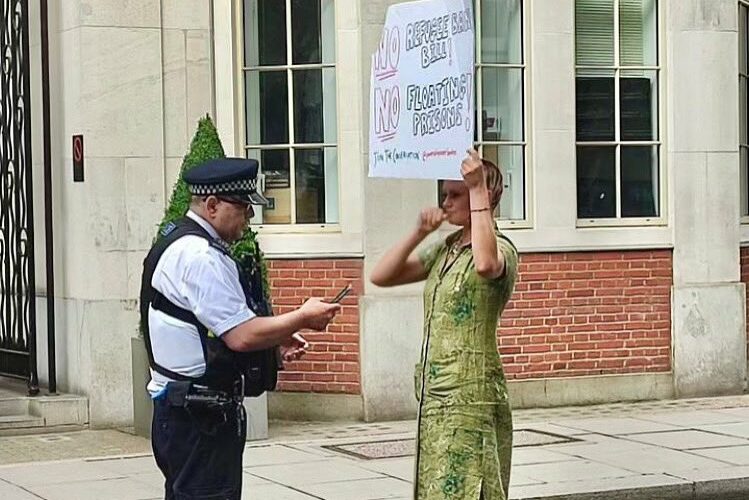I Was Arrested for Holding a Pro-Refugee Sign in the Street
Cops had to Google the law to decide what to arrest me for.
by Tigs Louis-Puttick
19 July 2023

Yesterday, our organisation, Reclaim the Sea, called a protest outside the Home Office against the illegal migration bill and floating prisons – barges that the UK uses to house asylum seekers. Our tweet got about 50,000 views, but only about ten people turned up.
We are currently seeing the worst asylum policy in our lifetimes; the issue needs and deserves more attention. So after about an hour protesting on the pavement, me and one other person decided to walk out into the road and stop private cars – which were mostly Teslas and Mercedes because of the area – while letting buses and taxis through.
The police hadn’t paid attention to our protest until this point – but as soon as we went into the road two police officers approached us and roughly tried to push us off it. We both resisted. They started fumbling around and trying to suggest they could put a Section 12 in place, which police can impose on a gathering or protest when they are concerned about serious public disorder.
I know what Section 12 is, but I asked him to explain it to me. He had to Google it, which is appalling. After Googling it, I think they realised they couldn’t impose a Section 12 because what we were doing did not constitute serious public disorder. For a while longer, they just tried to move us. They kept saying things like, “These people could be going home to their families!” I was like, “That’s great! They can turn around and go the other way”.
Lots of the public reacted positively. People on buses were making heart signs and giving us the thumbs up; even people driving fancy cars were responding with support when they saw our sign saying “refugees welcome”, and turning around. Our protest clearly entailed no serious public disorder.
But soon another police car pulled up. Two officers got out of the car and very, very, very physically – I would say roughly – pushed me out of the road saying, “You’re creating a highway obstruction”. I told them that I was going to go back on to the road, and reminded them that they hadn’t even explained to me under what powers they were demanding I move. They told me I was under arrest and put the handcuffs on quite harshly. I have a small graze and my wrist was quite swollen.
From the moment we went on to the road, it took just over twenty minutes for me to get arrested. The police are supposed to use a five-step process to get protesters to move. They didn’t use any of those steps.
I was taken to the police station in a van – which is really excessive for one person. During the arrest, I asked them what they were arresting me for, and whether there was a Section 12 in place. They said there wasn’t, and that I was “obstructing the highway”. But the traffic was free-flowing throughout our protest; there was no build-up of vehicles, no one was even honking. They didn’t want to take my questions.
I was taken to Hammersmith police station, where I was searched and questioned. I told them that I thought it was an unlawful arrest – but although the commanding sergeant said they would try and have the case expedited, I don’t think they did because I was in the holding cell for eight hours. I was released at 3.45 am. Throughout, I was so aware that I was being treated relatively well because I’m a white, middle-class, educated, English-speaking, able-bodied, cis woman. I am also highly aware that many asylum seekers receive worse treatment when they first arrive in the UK.
My arrest implies two things on a political level: that the right to protest in the UK has been severely, severely eroded in the past couple of years, and that the authorities are willing to take any steps to undermine protest against the worst-ever UK legislation against asylum seekers. Both protest rights and refugee rights are being severely attacked in the UK.
Even though the illegal migration bill has now passed through Westminster, there are still ways we can contest and protest it. In the coming weeks and months, it is vital that we resist this floating prison policy, which will put asylum seekers’ lives at risk, as well as threaten them with retraumatisation because of sea-related trauma.
People need to show up for refugee rights. We have had our protest rights limited by the policing bill, but we can still protest. And it’s so important we do so.
As told to Sophie K Rosa.


